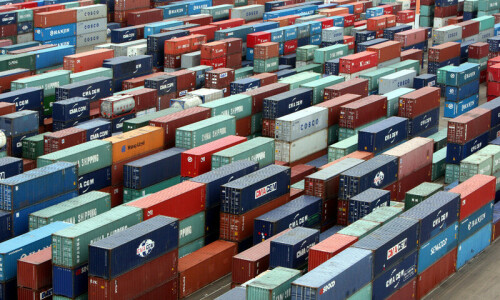KARACHI: Pakistan and the United Nations Office on Drugs and Crime (UNODC) launched the second phase of a programme — Improved National Response against Drugs and Contraband Trafficking in the Maritime Domain — here.
Funded by the US Department of State’s Bureau of International Narcotics and Law Enforcement Affairs (INL), this initiative is a 12-month endeavour aimed at enhancing Pakistan’s maritime capabilities to combat drug and contraband trafficking, said a UNODC statement.
The project will be jointly implemented by the UNODC Pakistan (COPAK) and UNODC’s Global Maritime Crime Programme (GMCP).
The ceremony was co-chaired by Pakistan Maritime Security Agency (PMSA) Director General Rear Admiral Imtiaz Ali and chargé d’affaires (CDA) of the United States Mission in Pakistan Andrew Schofer.
Other representatives from the UNODC, INL, Pakistan Coast Guards (PCG), and the Anti-Narcotics Force (ANF) were also present.
In his remarks, Dr Jeremy Milsom, UNODC COPAK representative, highlighted the agency’s collaboration with the Ministry of Narcotics Control during the design and implementation of the Phase I Project (October 2020 to March 2023).
“(The) UNODC is adopting a holistic approach to support the Government of Pakistan in addressing diverse drugs and crime challenges more effectively both domestically and by fostering Pakistan’s partnership at various regional and international forums,” he added.
Addressing the ceremony, Dr Milsom said that while fully aligned with UNODC’s global and country strategies, this Phase II project would greatly complement the government’s vision and ongoing efforts to strengthen Pakistan’s border management, drug supply reduction, and the rule of law – aimed at creating a secure environment for the Pakistani people.
David O’Connell, GMCP’s programme coordinator, delivered a comprehensive presentation on the threat dynamics related to the smuggling of drugs and other items through Pakistan.
He highlighted the achievements of the Phase I Project which aligned with the Government of Pakistan’s strategic priorities for border management.
O’Connell also provided an overview of the Phase II Project, detailing its intended outcomes such as ‘improvements to interagency coordination between Pakistan’s maritime law enforcement agencies’, enhancing cooperation between Pakistan’s law enforcement agencies and their regional counterparts and increasing the capability of Pakistan’s law enforcement agencies in detecting, deterring, and disrupting drugs and contraband trafficking through coastal areas and maritime domain.
In his remarks, Andrew Schofer emphasised that ensuring a secure maritime environment was not only a priority for Pakistan, but a global imperative, as drug trafficking and smuggling contributed to instability and jeopardise the security of nations worldwide.
“By confronting these issues head-on, we are contributing to a safer and more prosperous future for all while highlighting the 77 years of partnership between the governments of the United States and Pakistan, and the 42 years of the US Mission to Pakistan’s security assistance through the INL,” he added.
Speaking on the occasion PMSA chief Rear Admiral Ali said that due to its geographical disposition, Pakistan had long been exposed to the negative impacts of illicit trafficking of narcotic drugs and psychotropic substances from Afghanistan.
“As a signatory to the three United Nations drug conventions, the government of Pakistan envisions a healthier Pakistani nation – that is free from the menace of drug trafficking and the ill effects on health caused by using narcotics drugs,” he observed.
Opiates and synthetic drugs produced in Afghanistan were transported through the Arabian Sea and the Indian Ocean to various destination countries in South Asia, the Middle East, Africa, Southeast Asia, and Oceania, he went on to say.
Pakistan, therefore, continued to serve as the first line of defence against a massive outflow of narcotic drugs from Afghanistan — that threatened security throughout our region and beyond, Ali further said.
Published in Dawn, June 16th, 2024














































